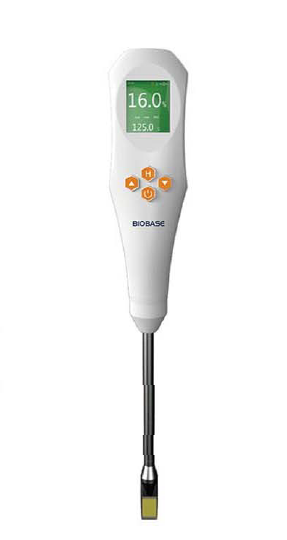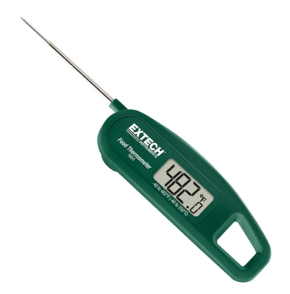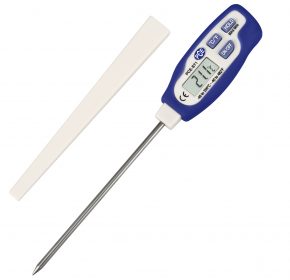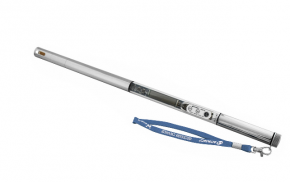Description
PCE-ATP 1 Food / Hygiene ATP Testing Meter
Enables rapid detection of bacterial or microbial residue / Stores up to 10,000 date- and time-stamped data records to internal memory / Provides connectivity via USB and Bluetooth printer interfaces / Includes PC software for analysis
PCE-ATP 1 is a food safety / hygiene – ATP tester, ATP meter, lumitester or luminometer used for surface testing. This luminometer allows for quick and easy first-generation adenosine triphosphate (ATP) testing and monitoring to ensure proper cleanliness, sterilization and sanitization. PCE-ATP 1 is an ATP tester that can be used for cleanliness control and documentation in many different applications.
Basic operation
Use PCE-ATP SWAB (sold separately – see accessories) to take a sample of the surface to be tested. Press the swab all the way down into the tube, so the swab comes into contact with the reaction liquid and reagent. Gently shake the tube to ensure the sample is fully covered. Insert the whole test tube into the measuring chamber of the PCE-ATP 1 ATP tester. After 10 seconds, the measurement results are shown in relative light units (RLUs) on the ATP tester display.
More Information about ATP Tester
Monitoring of hygienic conditions is essential, no matter what sphere of life it goes about. Still, there are certain areas where it is of crucial importance. Food industry and food producing enterprises are among the first to get the biggest attention from the controlling authorities. Not only it is important for the customers to get a clean and safe for health product, without contamination and danger to catch undesirable bacteria or illness together with the purchased bad-quality product. It is absolutely devastating for the food enterprise if complaints from the customers about the quality get a permanent character, which in the long run ruins the reputation and brings to huge financial losses.
A new method of quick and efficient detection of ATP (adenosine triphosphate), as against to the usual conventional visual inspection (not sufficient and reliable enough) or microbiological tests (take a lot of time), helps to quickly find out how dirty the surface is, evaluate the risks and carry out elimination of the existing problem. It is a tool that helps to see what even the most attentive and sharp eye cannot see – invisible bacteria which, if not eliminated, can bring aggravating consequences after their developing and spreading! For sure, ATP is present in every living microorganism, cell, and of course, foodstuffs, bacteria, mold and similar, but the level of it may tell a lot about contamination of a certain surface contacting with certain foodstuffs, either the limit is exceeded or within the admissible range.
It is a tool that helps to see what even the most attentive and sharp eye cannot see – invisible bacteria which, if not eliminated, can bring aggravating consequences after their developing and spreading! For sure, ATP is present in every living microorganism, cell, and of course, foodstuffs, bacteria, mold and similar, but the level of it may tell a lot about contamination of a certain surface contacting with certain foodstuffs, either the limit is exceeded or within the admissible range.
In the majority of cases, production and the products themselves do not exist in the isolated vacuum. So, the total value of ATP that should be studied and analyzed is a collective value that is made up of many values from different sources in the environment containing ATP.
The range of application of the ATP tester is wide, and first of all, it includes various branches of the food industry: brewery and beverages production, fish, meat, poultry processing industry, vegetable and fruit processing, catering, baby food. The ATP monitor is a small device, not bigger than of a pen size, portable and reliable. 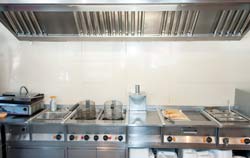 An ATP tester / luminometer is easy to operate and the immediate results allow analyzing the situation immediately on site. The ATP monitor helps to detect the food residuals on the table or any surface and if they are present – indicates the necessity to carry our cleaning measures before starting the production. The same applies to water and liquids and the tester can be applied even in the pipes or water containers.
An ATP tester / luminometer is easy to operate and the immediate results allow analyzing the situation immediately on site. The ATP monitor helps to detect the food residuals on the table or any surface and if they are present – indicates the necessity to carry our cleaning measures before starting the production. The same applies to water and liquids and the tester can be applied even in the pipes or water containers.
Since there is a big amount of disinfecting cleansers and detergents applied every day, a fair concern may be, whether the results remain accurate if the measurements are carried out there where the chemical agents are / were applied. An advantage of the ATP tester is that the influence of the disinfecting agents on the ATP monitor minimized due to its design and working principle. The measuring unit is a relative light unit (RLU), which is in fact, the intensity of light emitted by the sample. During the measurement, the ATP tester registers photons which are released in the result of a reaction between ATP molecule and ferment luciferase-luciferin. The result is directly proportional to the ATP value. Usually, the higher the measurement result / value, the more bacteria are detected.
An important fact is that there no strict limits which apply to all the food categories. Much depends on the processing of the foodstuff (whether it is frozen, boiled, fried) as well as on the category of consumers (small children, elderly people, healthy / sick people and similar) – An ATP monitor helps to save lives.
– Offers a measurement range of 0 … 999,999 relative light units (RLUs)
– Stores up to 10,000 date- and time-stamped data records to internal memory
– Enables rapid detection of microbial residue
– Displays accurate measurement results on large LCD screen after just 10 seconds
– Performs quantitative determination of intracellular and extracellular ATP
– Features autocalibration and multiple user functionality
– Provides connectivity via USB and Bluetooth printer interfaces
– Includes PC software for analysis
|
Detection method |
Analog integration by photodiodes |
|
Data output |
Relative light units (RLUs) |
|
Background interference |
± 5 RLUs |
|
Measurement width |
0 … 999,999 RLUs |
|
Measuring time |
10 seconds |
|
Display |
3.5 ” graphic LCD |
|
Interface |
USB |
|
Memory |
10,000 measurement records |
|
Self-calibration |
Automatic cleanliness testing before each use |
|
Environmental conditions |
+5 … + 40 ° C / 41 … 104 ° F, 20 … 80% rh |
|
Storage conditions |
-10 … +40 ° C / 14 … 104 ° F, max. 60% rh |
|
Voltage supply |
3.7 V / 2300 mAh Li-ion rechargeable battery |
| Battery life | Operating: 10 hours Standby: 600 hours |
|
Dimensions |
189 x 70 x 35 mm / 7.44 x 2.7 x 1.3 “ |
|
Weight |
280 g / 0.62 lb |




